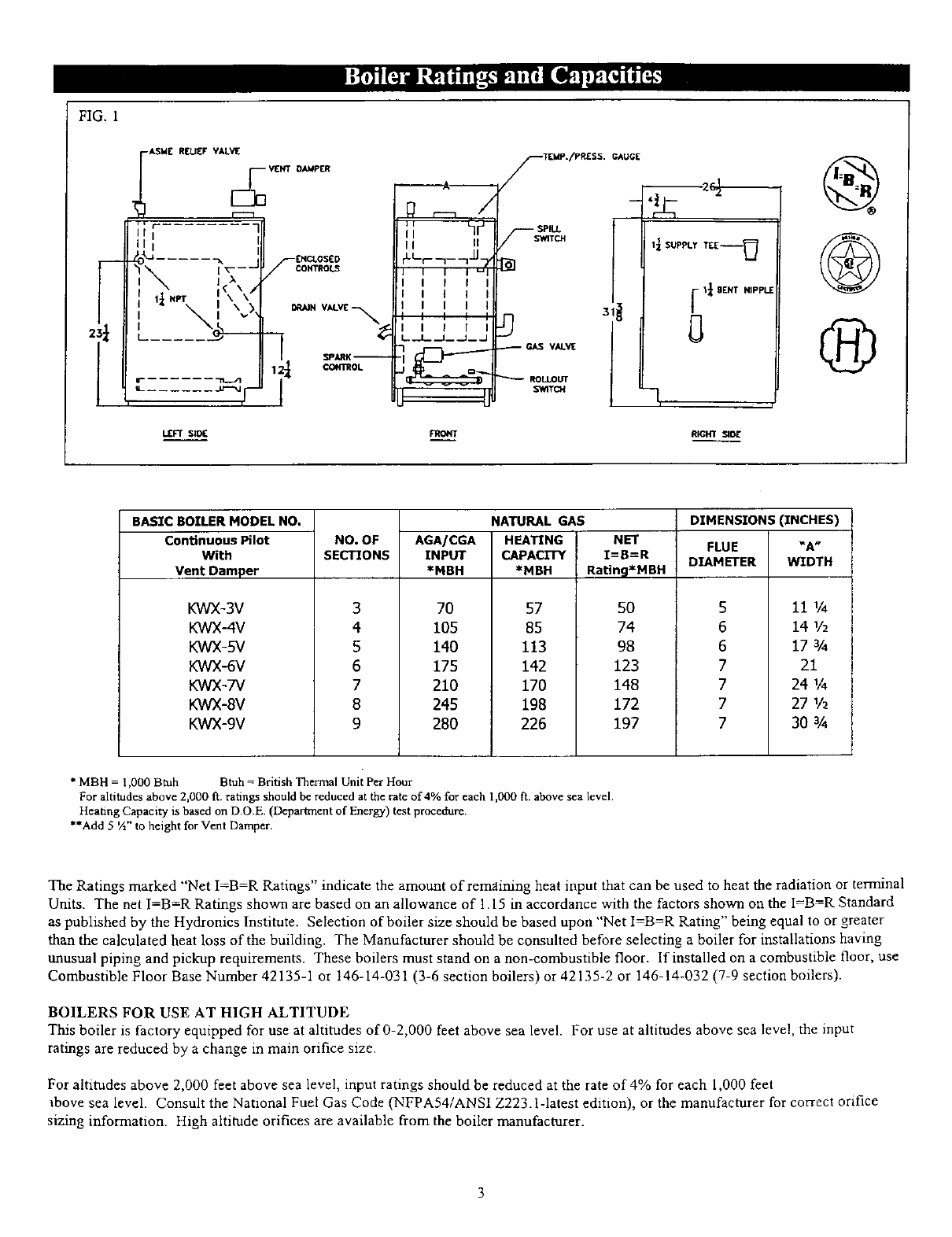
FIG. 1
r---
I
?
!
-ASME R[[J_¥ VALVE
C_ VI£NT
l
l
,-_ ..... -I,
[_-----
J
i<\/
I;[ HPT , \ \
"_ i \.A
L ...... ,.Lr'--_l_ [
i
LEFT S;DE
DAMPER
ENCLOSED
SCOHTROL_
• _AJN VALVE %
COH_OL
--A u
hr_
I I II
I I I
I I i
i I I
_._L_ _.1__ _1__ _
TEMP./PRESS. GAUGE
J I r' 'E'r'PPLE
31?
GAS VALVE
RIGHT SIO[
®
BASIC BOILER MODEL NO.
ConUnuous Pilot
With
Vent Damper
KWX-3V
KWX-4V
KWX-5V
KWX-6V
KWX-7V
KWX-8V
KWX-9V
NO. OF
SECTIONS
3
4
5
6
7
8
9
AGA/CGA
INPUT
*MBH
70
105
140
175
210
245
280
NATURAL GAS
HEATING
CAPACITY
*MBH
NET
I=B=R
Ratin9*MBH
5O
74
98
123
148
172
197
FLUE
DIAMETER
DIMENSIONS (INCHES)
"A"
WIDTH
57
85
113
142
170
198
226
5
6
6
7
7
7
7
11 1/4
14 1/2
17 ¾
21
24 1/4
27 1/2
30 ¾
* MBH = 1,000Btuh Btuh = British Thermal Unit PerHour
a
For altitudes above 2,000 ft. ratings should be reduced at therate of4_ for each 1,000ft. above sea level•
Heating Capacity is based on D.O.E (Deparirnent of Energy) test procedure.
**Add 5 ½" to height for Vent Damper.
The Ratings marked "Net I=B-R Ratings" indicate the amount of remaining heat input that can be used to heat the radiation or terminal
Units. The net I=B=R Ratings shown are based on an allowance of 1.15 in accordance with the factors shown on the I=B=R Standard
as published by the Hydronies Institute. Selection of boiler size should be based upon "Net I=B=R Rating" being equal to or greater
than the calculated heat loss of the building. The Manufacturer should be consulted before selecting a boiler for installations having
unusual piping and pickup requirements. These boilers must stand on a non-combustible floor. If installed on a combustible floor, use
Combustible Floor Base Number 42135-1 or 146-14-031 (3-6 section boilers) or 42135-2 or 146-14-032 (7-9 section boilers).
BOILERS FOR USE AT HIGH ALTITUDE
This boiler is factory equipped for use at altitudes of 0-2,000 feet above sea level. For use at altitudes above sea level, the input
ratings are reduced by a change in main orifice size.
For altitudes above 2,000 feet above sea level, input ratings should be reduced at the rate of 4% for each 1,000 feet
above sea level. Consult the National Fuel Gas Code (NFPA54/ANSI Z223.1-1atest edition), or the manufacturer for correct orifice
sizing information. High altitude orifices are available from the boiler manufacturer.
